
T H R E E
I I

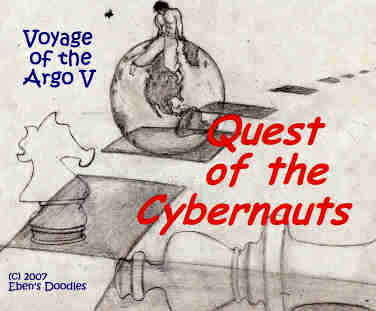
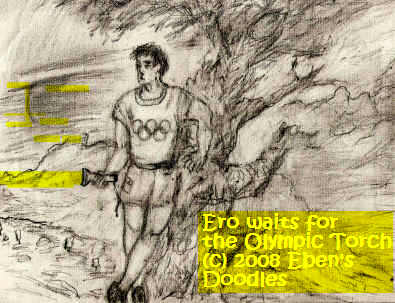
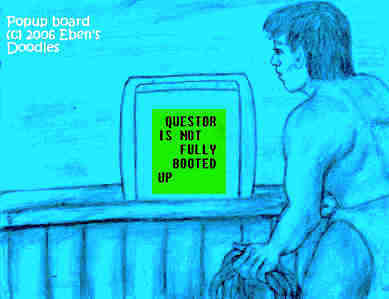
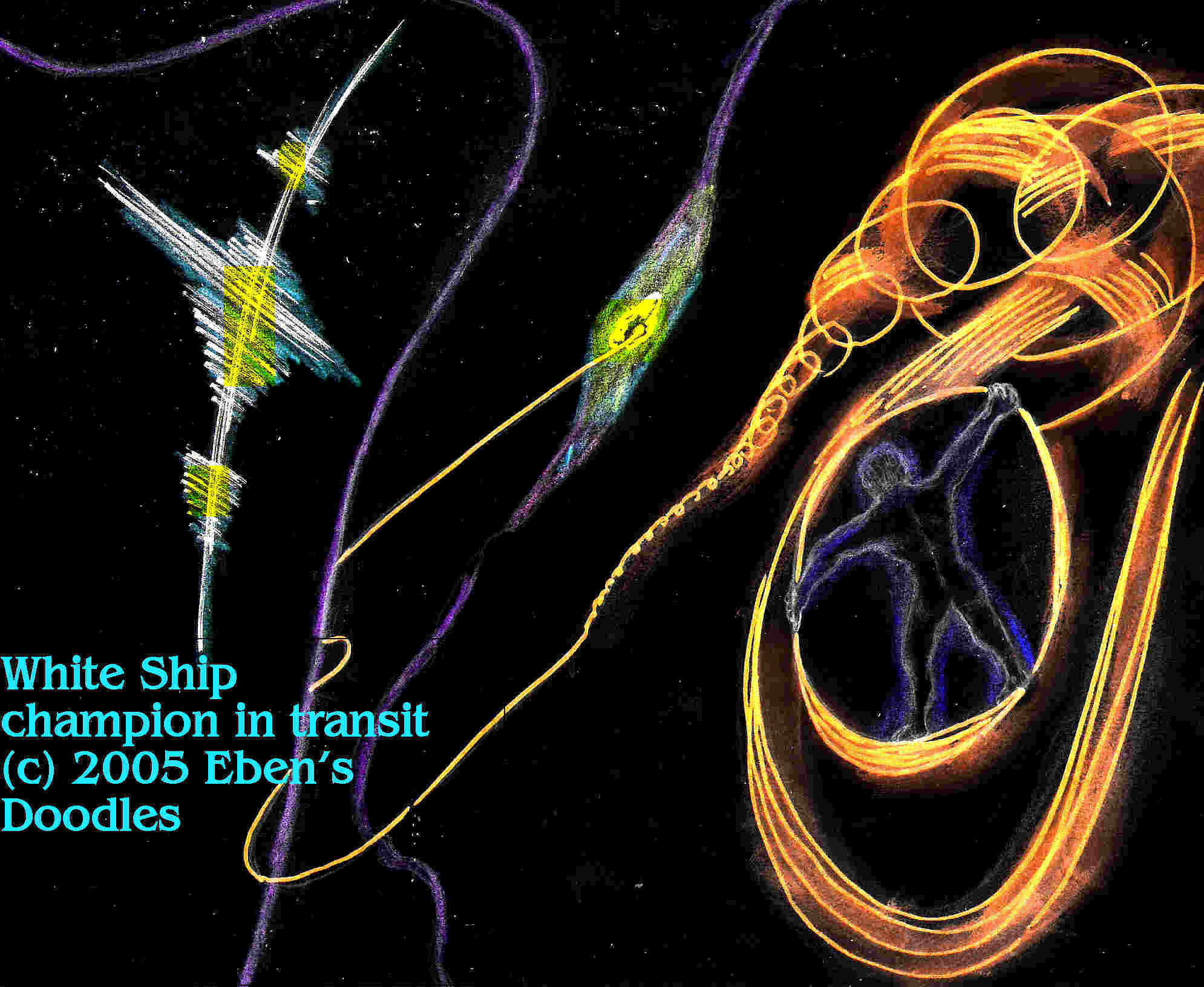
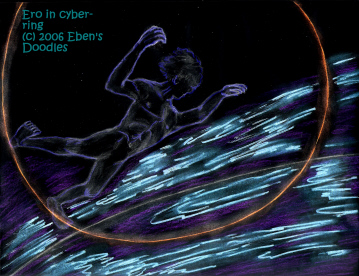
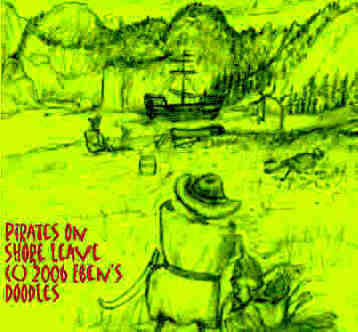
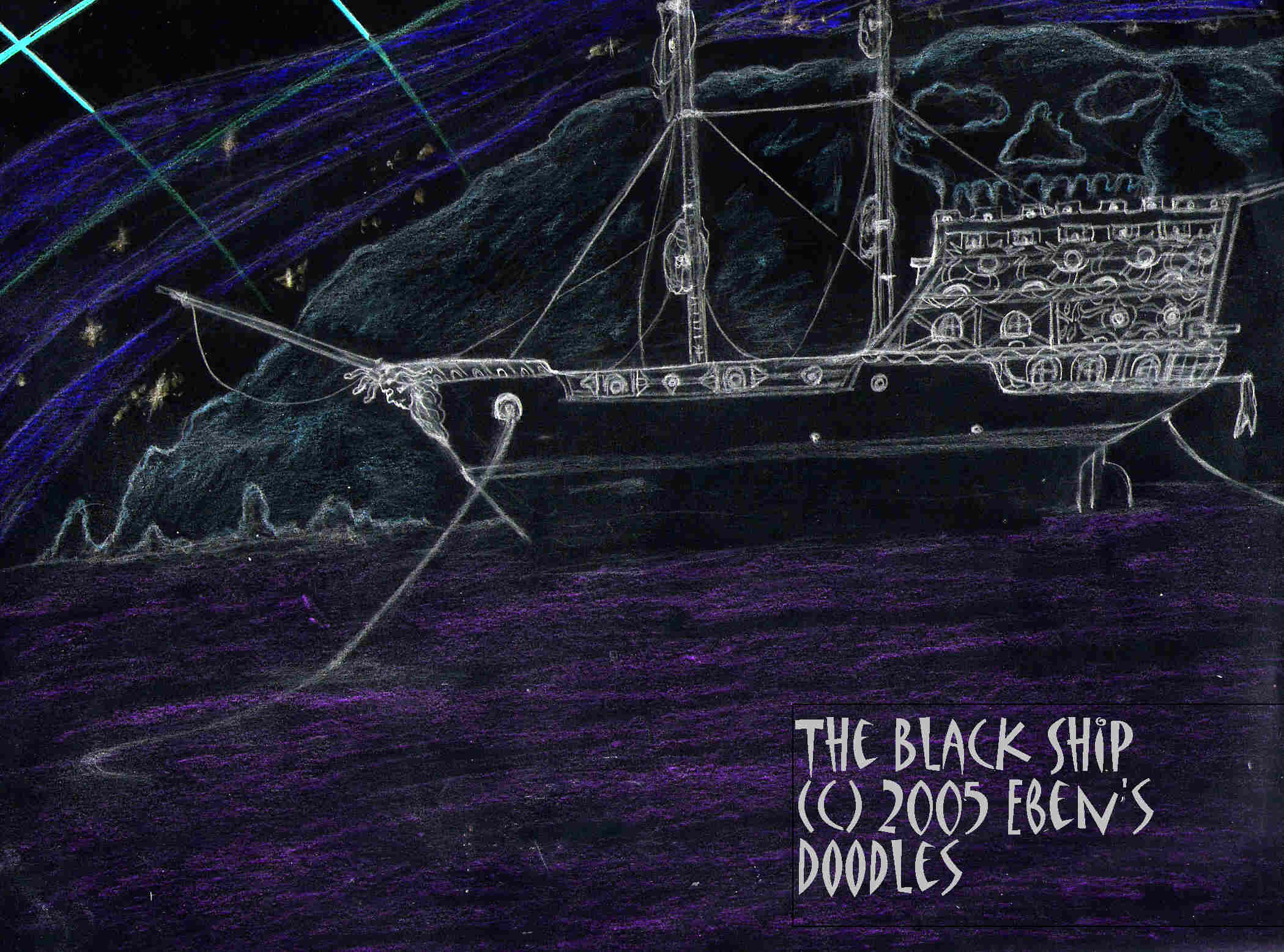
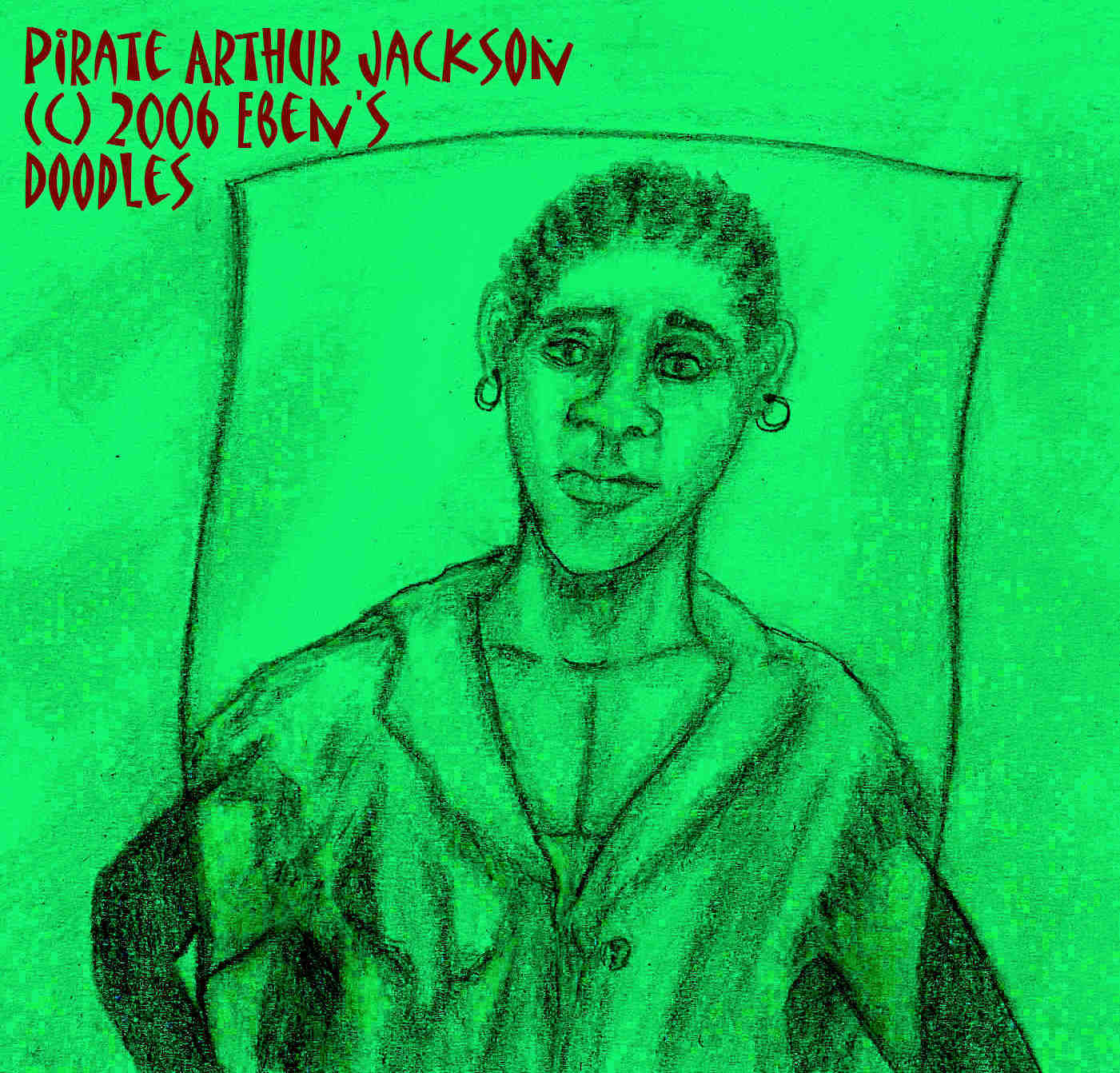
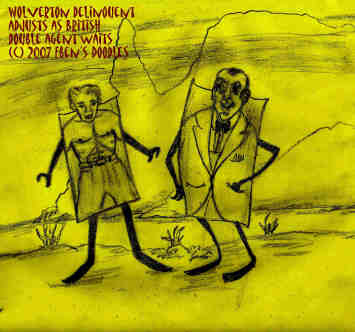
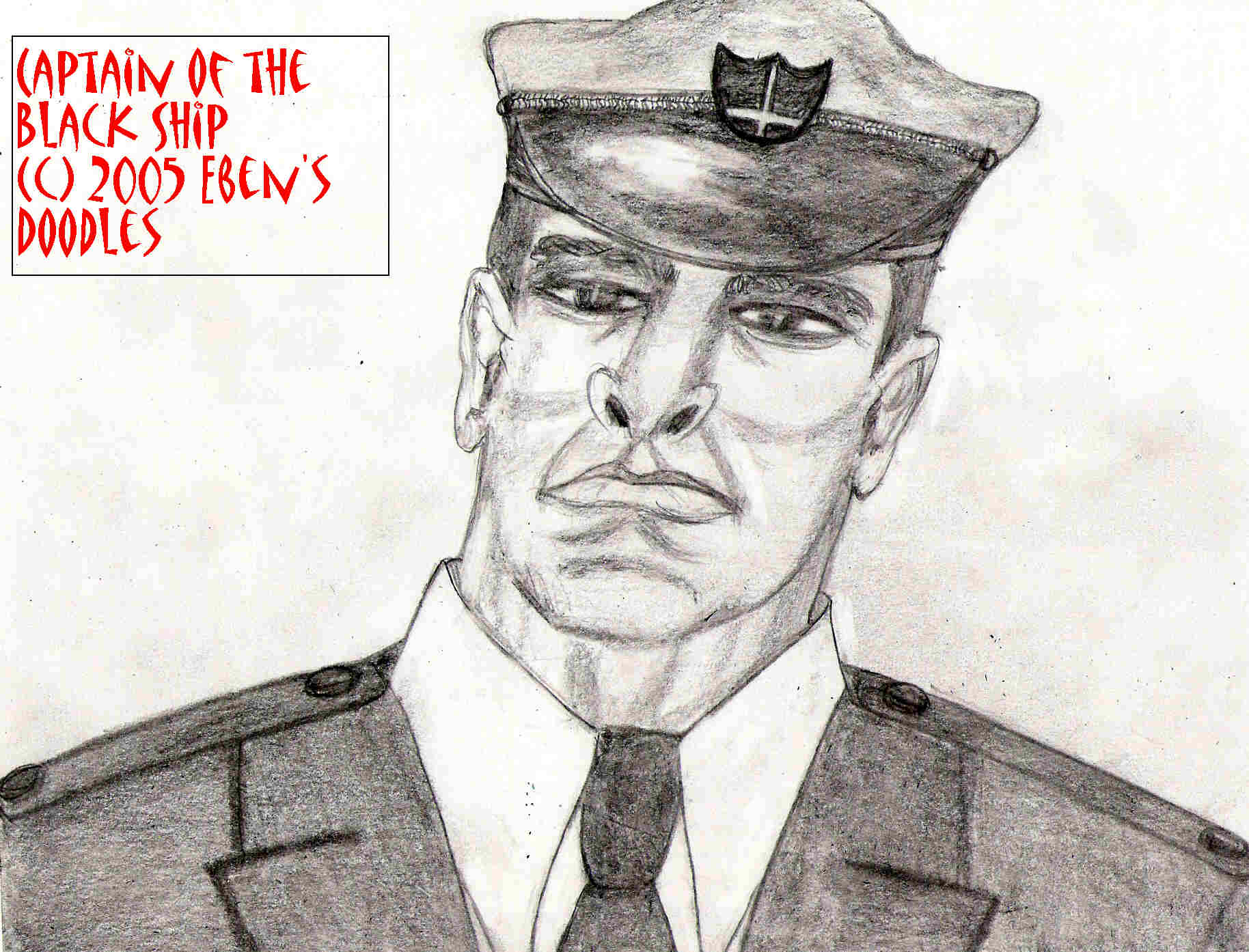
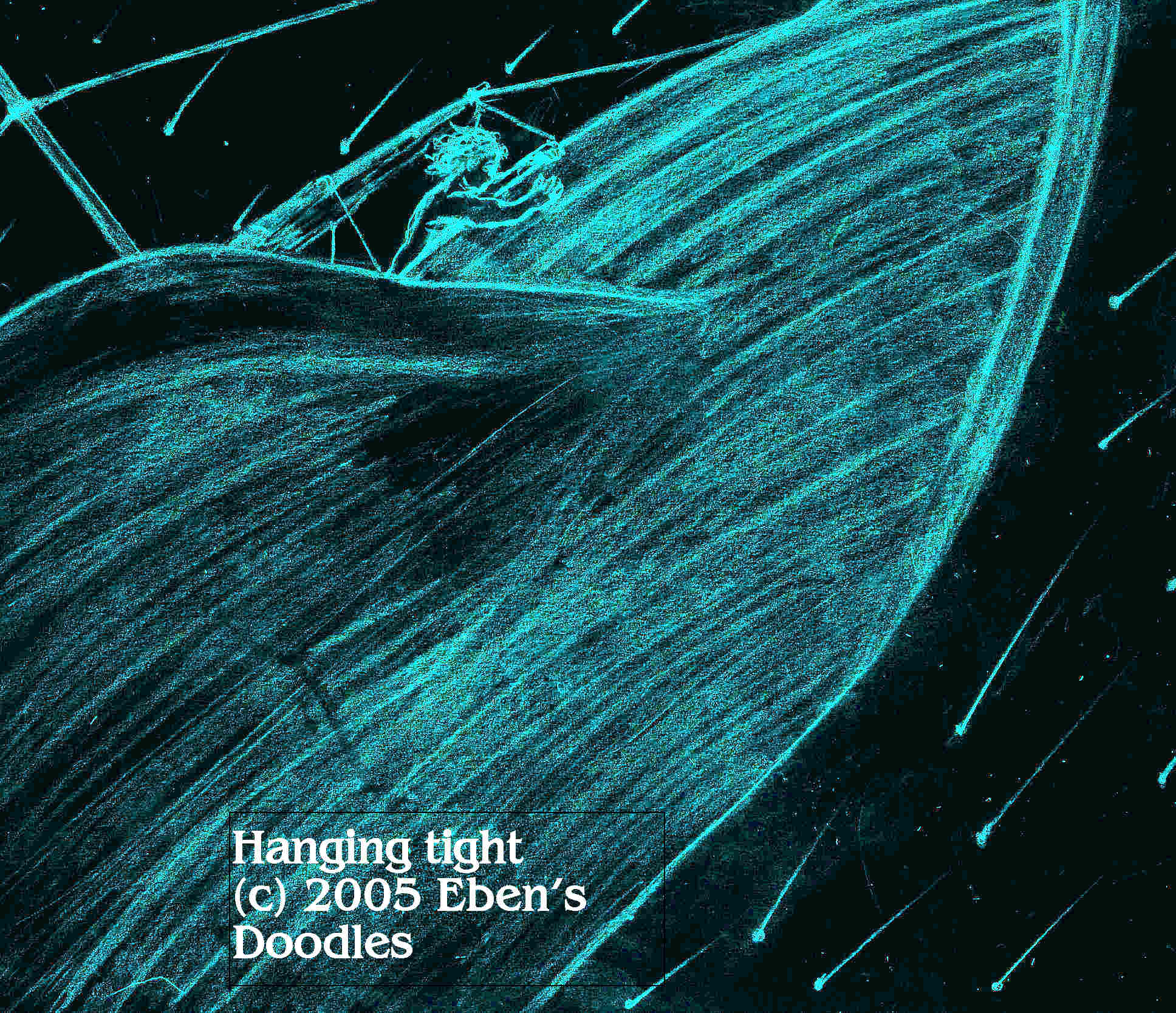
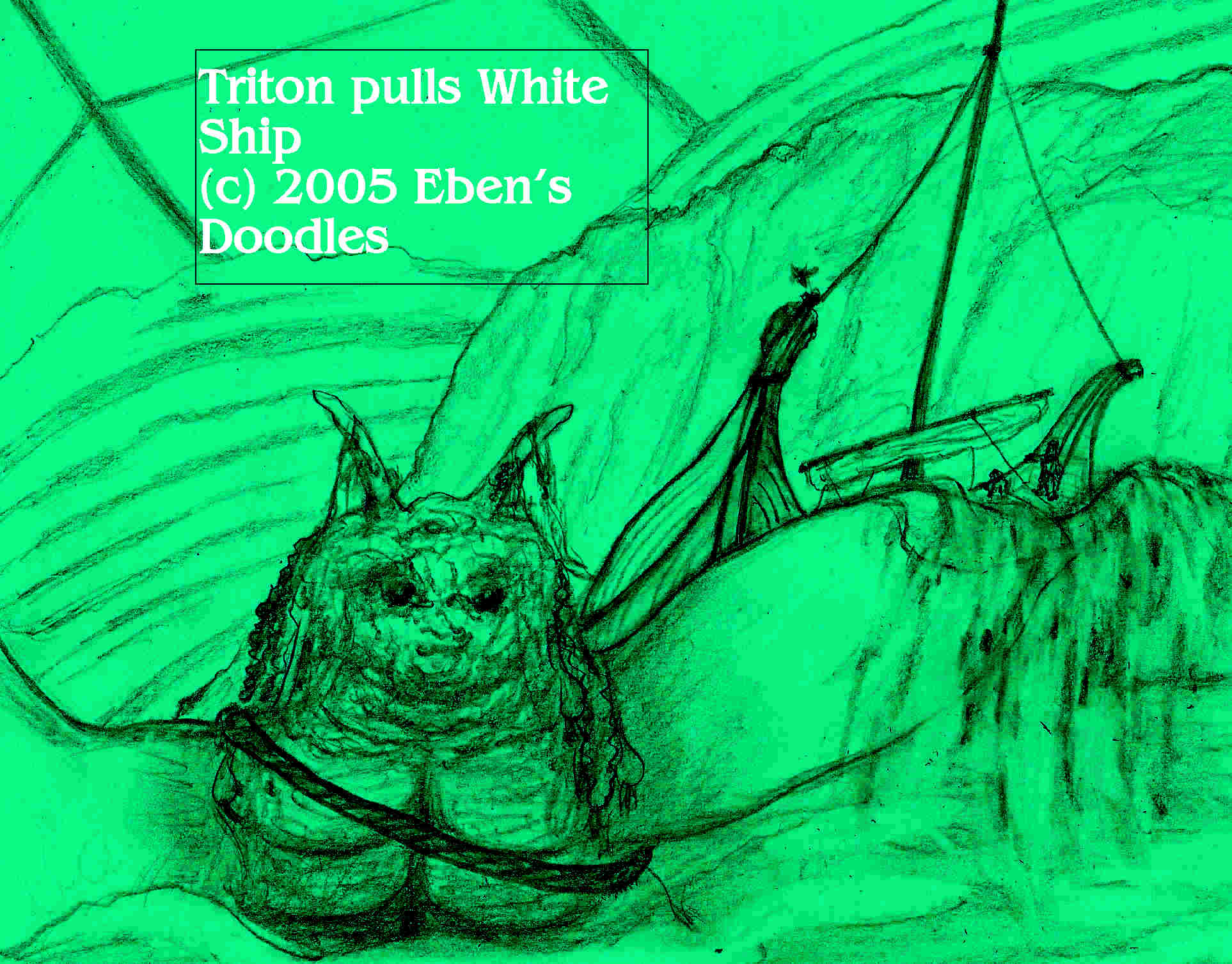
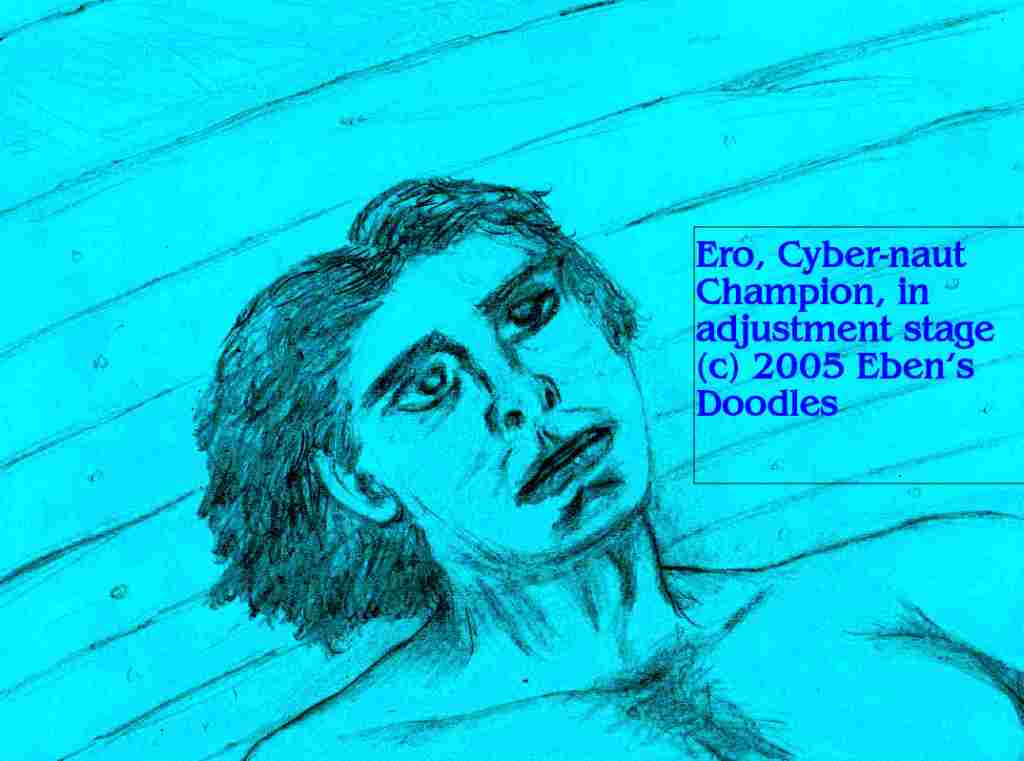
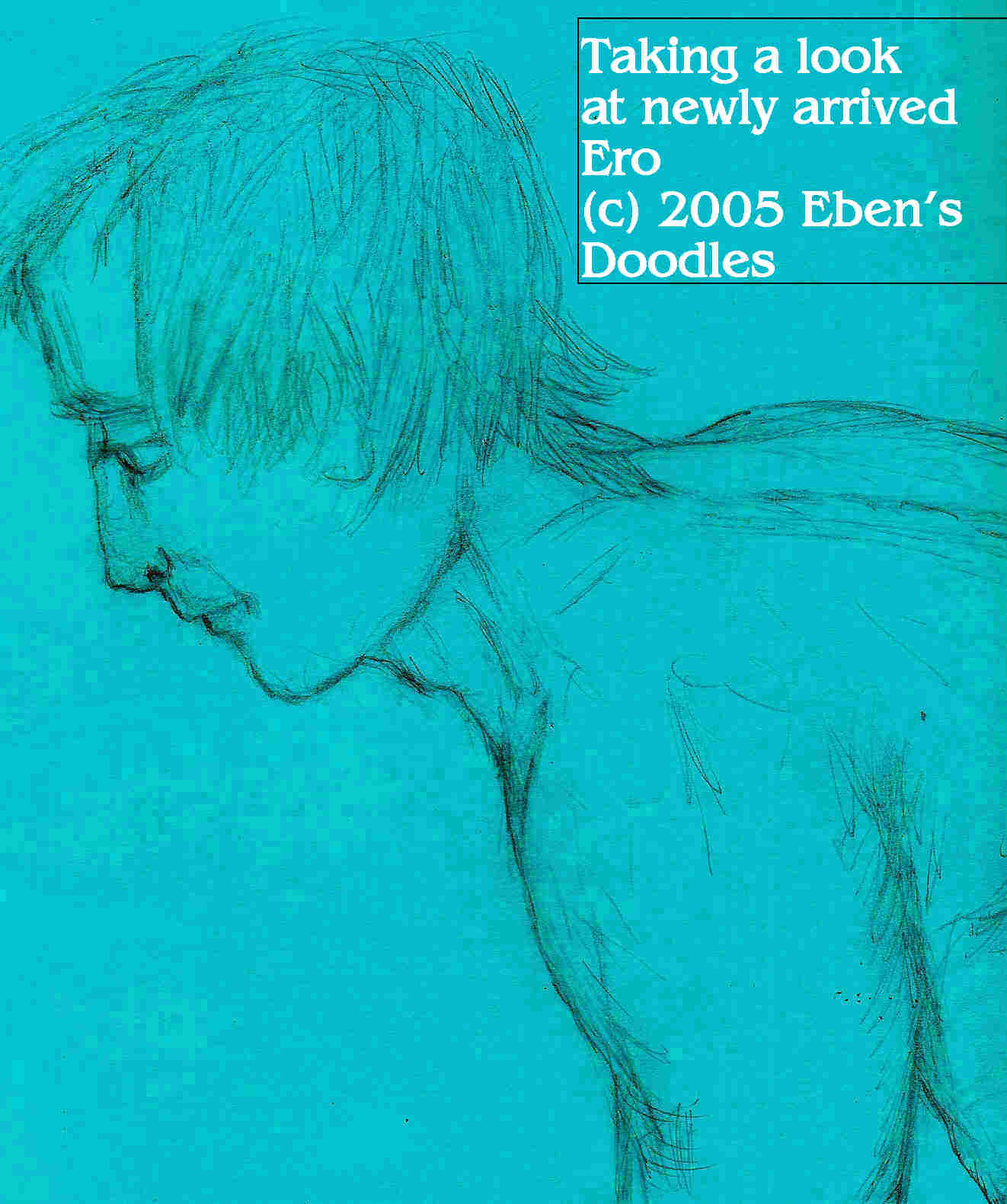
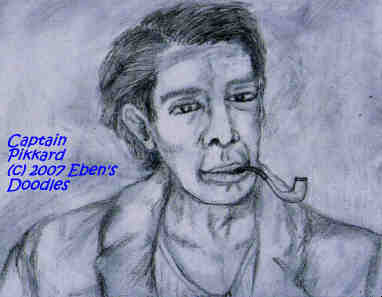
There is little danger of any of the cybernauts taking an interest in the serving women on board. The black woman, Madame Tumpo, is all business when it comes to her duties as ship cook, and her helper, Betti, is an almost mindless victim of the pirates--more like a child than an adult. Amazingly, in her former life, she had been none other than Betti Bangles, the most sought after film star in Holland America--but you wouldn't guess that looking at her now. She was treated so wretchedly, she is half-crazed and almost toothless.

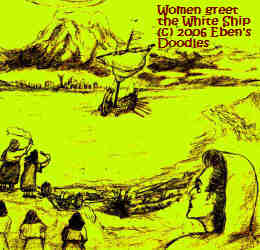
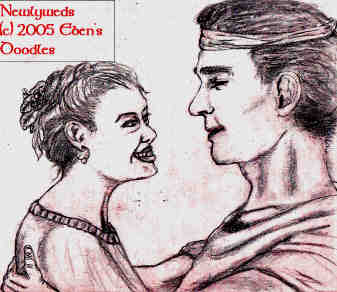
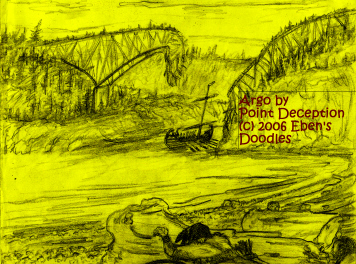
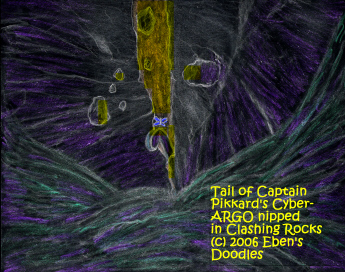

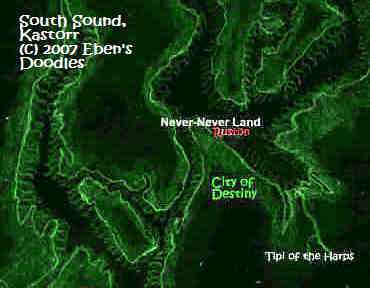
Now it was deserted--as this city was stuck in virtual reality, with scarcely an inhabitant to hold down Fort Nisqually that had been moved up to be the centerpiece of Point Defiance Park. He wandered around in the Park and looked in Never Never Land, which included both Mother Goose Land (a children's area with nursery rhyme characters) and the old, reconstructed fort.
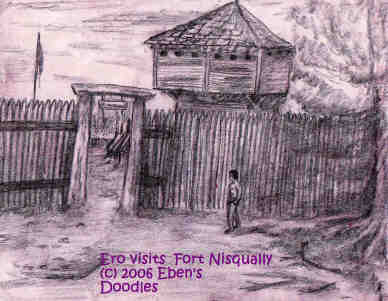
<
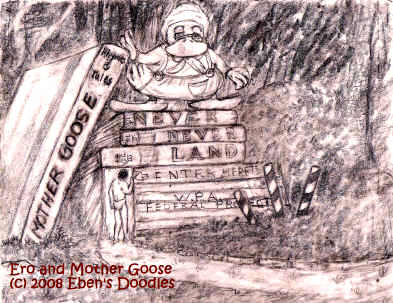
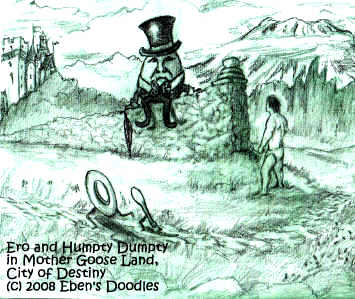
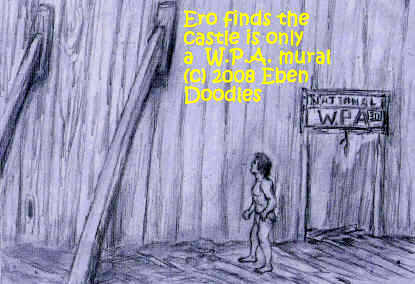
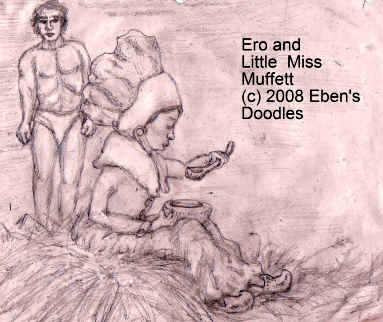
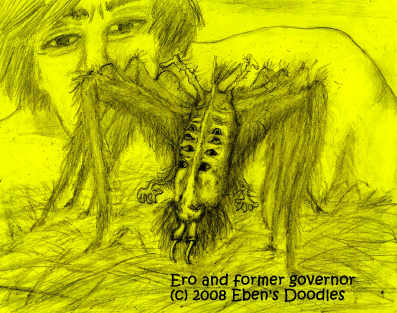
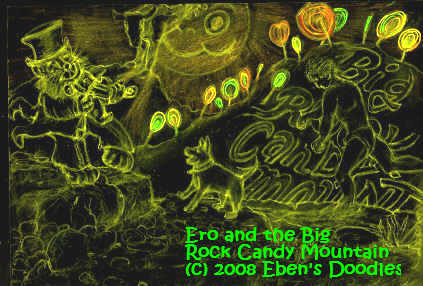
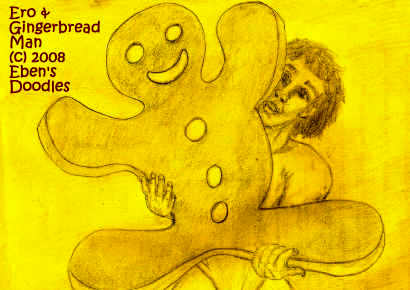
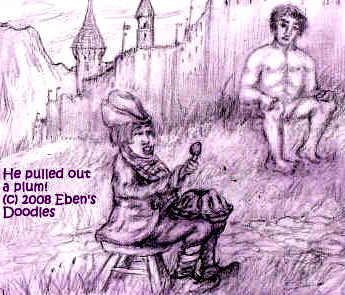
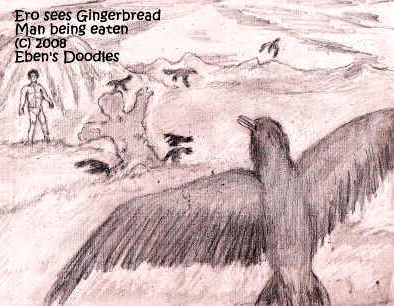
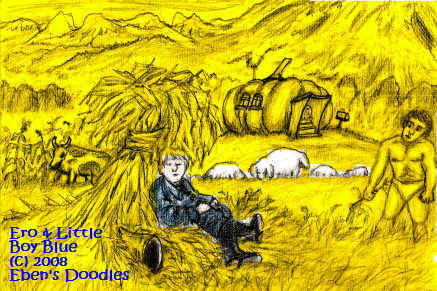
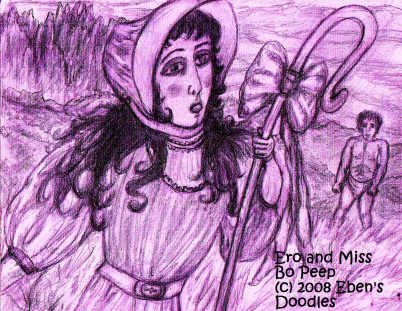
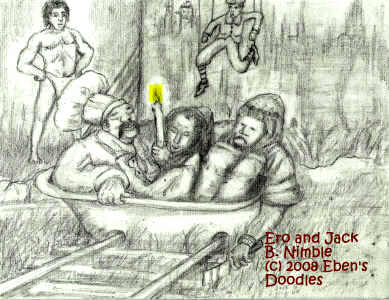
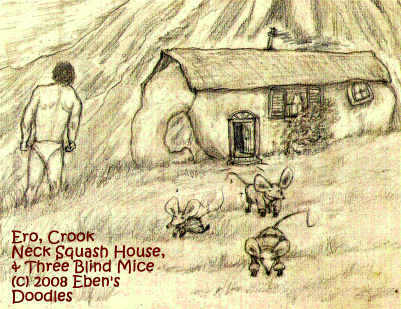
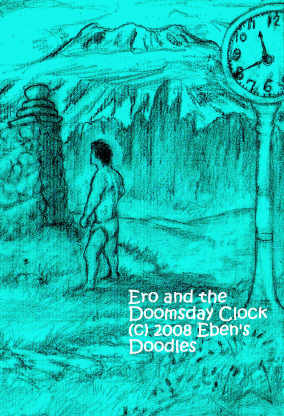
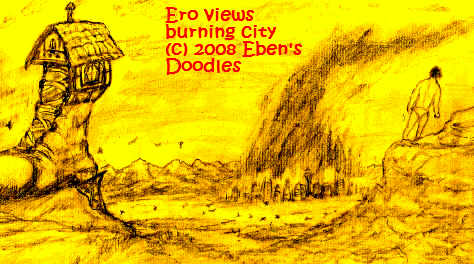
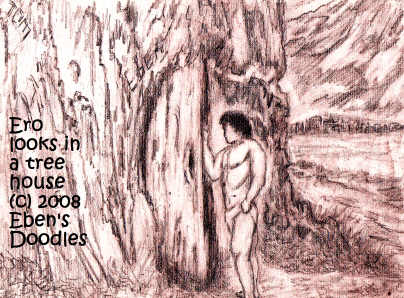
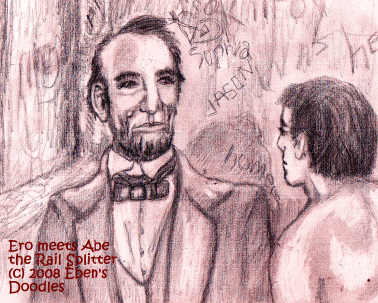
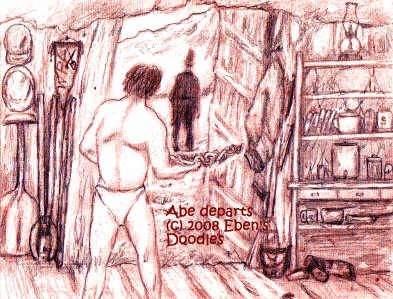
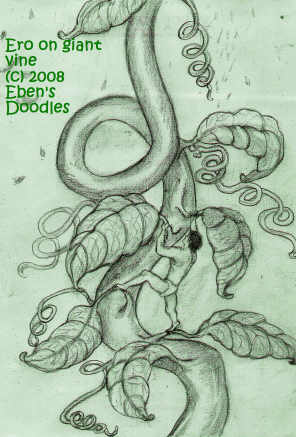
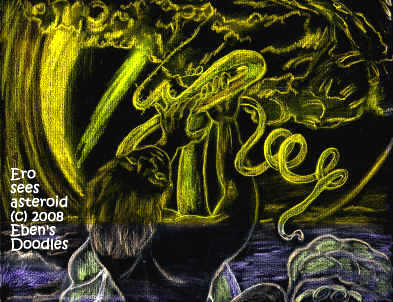
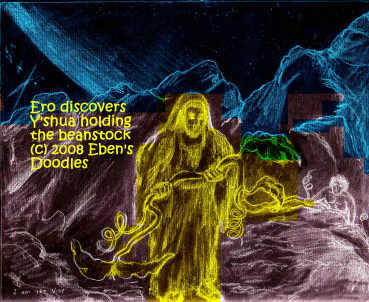
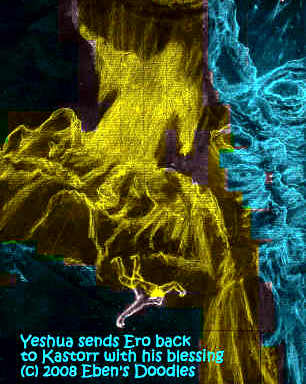
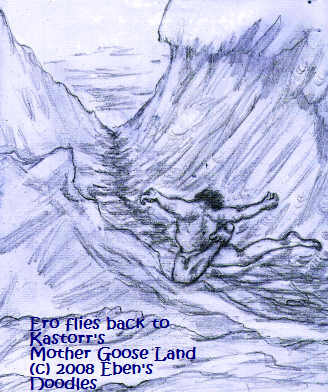
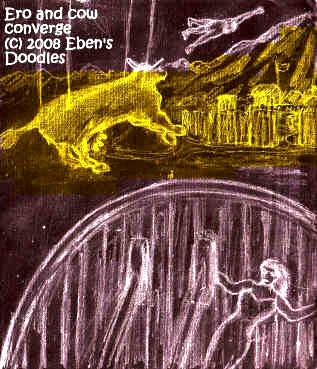
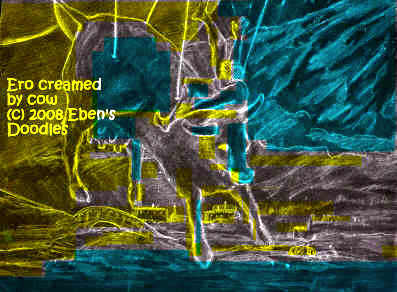
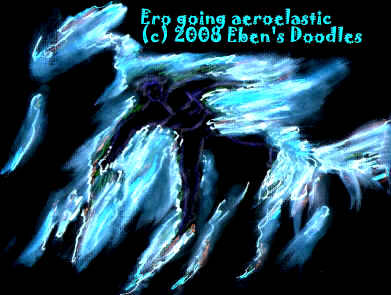
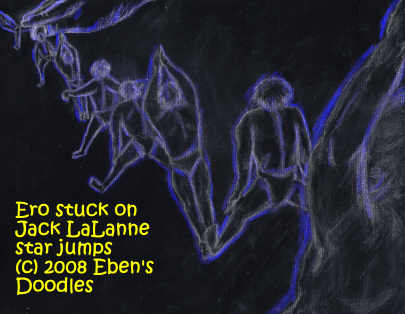
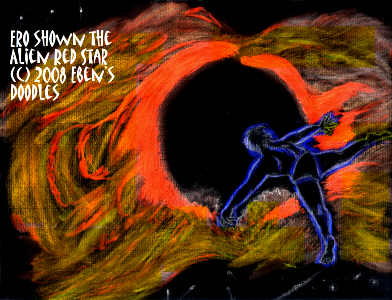
Loving the feel of the earth beneath his feet, he retraced his path on the steep streets to the waterfront, which suited him more, being a sea-loving Greek.
Since they were supposed to help provision the ship, he started looking around. Not a person showed himself at the smelter with the towering stack, or at a huge grain elevator, or in the rows of warehouses.
Suddenly, a rabbitty animal bolted out of the open door of a warehouse when he went to look in. Seeing his dinner getting away, Ero gave chase. The rabbit made for the beach in a zig-zag way of rabbits. Though wondering about this particular specimen, he had chased hares enough in the Peloponnesos and even on Seriphos his home island enough to know their tricks. Certain it would try to make for its hole under driftwood or rocks, he raced to head it off. But the rabbit dove into a tangled wood pile.
Ero swore as he thought of the wasted time and energy. He was very hungry by now. He found a club and waited where he last saw the rabbit.
He did not have long to wait. But what he saw made him hold off clubbing it.
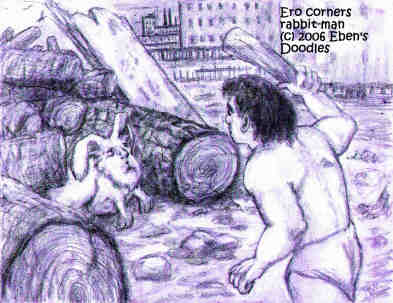
As he walked along the side of Commencement Bay (so-named because so many journeys commence there), gazing across it to the hills and Browns Point on the other side and then at a big Olympic stadium in the hillside, with what looked to him like a castle towering above it, he wondered what he would find in the city that lay beyond.
He climbed up through the stadium, walking alongside a big, abandoned French chateau-style hotel that was built to serve the rail line but was never completed.
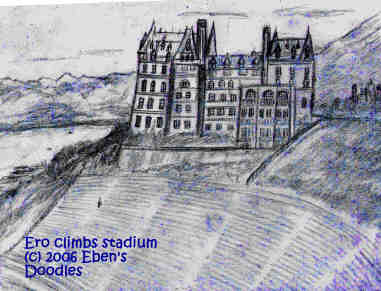

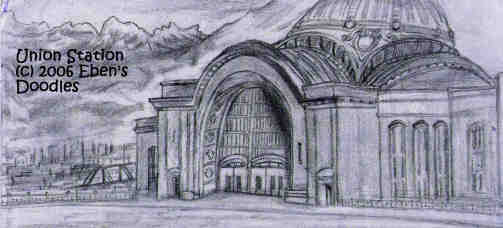
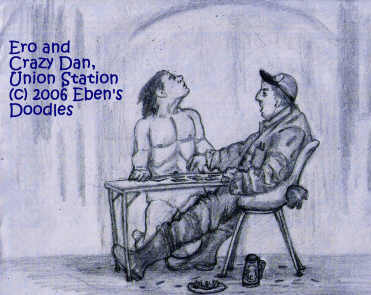
Ero wasn't listening as the old man complained, still playing his cards. He headed for the door, and soon found a way up this interesting train station that had no trains but still had a lot of dome to it.
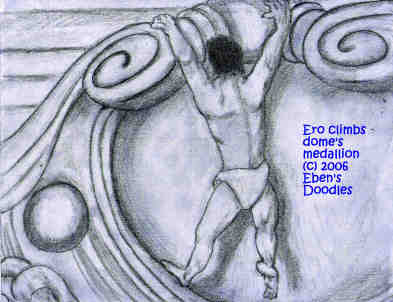
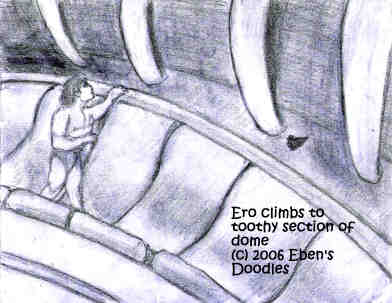
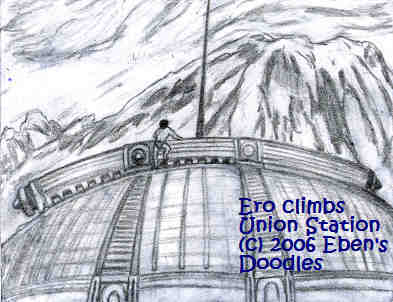
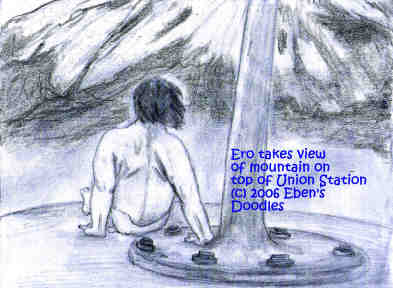
He reached out again, and though careful not to slip over the edge of the dome, he found that the mountain and the clouds and sky were not real at all. They were a scene somebody had pulled across the view, to give it a nicer look. Curious as much as repelled, he leaned out as far as he could and touched the mountain again. It gave way to his touch, and it even parted as if it were a curtain. That settled it for him. He wasn't afraid any longer of falling. He leaped at the mountain, grabbed it, and the next moment he was swinging behind it, still with a grasp on the paper thin mountain.
Behind it was darkness, lit by something in the upper background. He jumped away from the curtain and landed in a gulley, very steep, strewn with rocks piled one on top of the other. He climbed up the opposite side to get a better view of the top of the rocky slope, and found that it overlooked a shoreline where ebbtide had left pools of water and large, exposed rocks.
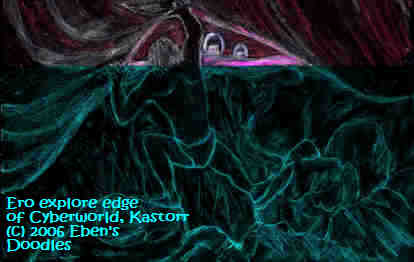
But he felt the sadness at the heart of this dark sea, he sensed something not sad but sinister, a Something was gazing back at him, Something full of hate and cunning and great power. Suddenly, he did not want to explore any further into this chilling, dark watery backstage of his bright, outer world. He turned and made his way as fast as he could to the bottom of the rocks, and then made a leap that carried him through the backside of the mountain and out into the light of day. He rolled to a stop, painting, still shocked at what he had found. He jumped up, looked around, and there rose the Union Station as regally and substantially as before. Ero blinked rapidly. Had he imagined the world behind the mountain? The mountain looked absolutely real where he stood. He took a few steps toward it, then reconsidered, and spun around, and, as he had been advised, found the street that Crazy Dan said would take him to Kelly's Tavern.
He did not have to walk very far. It was three blocks down on the left side of the street, which he saw on a street sign was named Pacific Avenue. It was a small, brick sided building, a few yards from tracks that crossed Pacific and headed toward the back of Union Station.
He could not tell anything from the windowless walls of the tavern, exccept that the sign said "Kelly's, and "Good Food, Good Music, Good Drinks and Jackpot Pull Tabs."
He found himself in the dark immediately, and his eyes had to adjust first before he could see anything ahead of him in the dark wood paneled room hazy with cigarette smoke. It looked like any working men's and sailors' tavern, except that the little tables where about twenty people, all regulars, were seated were arranged close to a loudspeaker system and mike, and a couple drums and a few instruments.
The reason for the seating was the proprietor was a former jazzman, who in his salad days had entertained Al Capone at a club in south Chicago Al favored, and who could still win wild clapping from his listeners whenever he felt up to playing them Al's favorite numbers.
With his reputation, Kelly drew jazz lovers from all over, even the likes of Alice in Chains singer Layne Staley, Kurt Cobain, and a feathered, beaded Janis Joplin, so no one came to throw Ero out because he wasn't dressed like the others--he might have been a millionaire's son who walked off a yacht at the marina docks a block away, for all they knew.
Ero looked around. A couple sat at one table nearest the wall, hand in hand, and they never looked or showed any one attention except the waitress, and a big-stomached, older man with wispy, reddish hair and his thin, even older looking helper who were washing up behind the bar.
The wispy-haired man, wearing a white bartender's apron emblazoned with "Kelley the Fearless Bouncer," laid it aside. He took his cane and went to the little stage, and picked up a bass electric guitar and sat down and began to tune it. The couple at their table sat talking quietly, totally absorbed in each other.
Instead of the waitress, who was on her break, the older bartender came out to Ero's table, his towel on his arm, and gave him a menu and a drinks list. He went away.
Ero did not even have time to look at it as the door behind him swung open, and an old woman with bifocals and burgundy pants suit entered, going directly to her table which had a Reserved Sign on it next to a pot of peppermint tea, a wine glass, and a lit candle.
She did not sit but pulled a mirror and tube of lipstick from her jacket pocket and spread a little Betty Grable cherry red on her lips, smacking them together a couple times in her mirror, then blotting them on a napkin. Ready for her performance, she bent over the fat, wispy-haired man, and they talked for a few moments, and then the big, wispy-haired man rose, took the mike and announced that his mother-in-law, Fast Lucie, would favor them with a special song! As he made this announcement, the older bartender sat at a small organ and was playing an accompaniment to Kelly's words, adding flourishes, as Kelly plucked at his bass electric guitar and told dirty jokes.
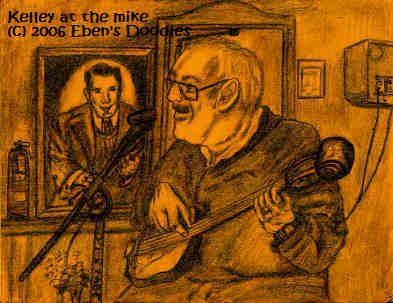
After he had finished the last and dirtiest nun joke, underscoring the punch line with combined flourishes of the organ and his electric guitar, Kelly turned to the special feature of Happy Hour.
"Yes, ladies and gentlemen! Have we ever got a a special treat for you all tonight! Yessir! Fast Lucie, whom you all know as the Owl Party Candidate of 1976 who placed third with 46, 807 votes for the office of Secretary of State in this godforsaken state, has still got her opera diva's vocal chords in fine fettle, and she's agreed to try out a brand-new number, the smash hit, "Red, Red Robbin," which is presently Number 1 on Kelly's Hit Parade!"
After this introduction, Ero wasn't sure he wanted to hear her any more than Crazy Dan back at the Union Station. But as he turned to go, he stopped, finding himself literally up against a blank wall. No door! This made Ero, a freedom-loving Greek, almost go crazy to discover without the slightest warning! He rushed the opposite direction, looking for a window, another door, any way out of the building. Nothing! He could still break out if he could, by using the furniture, to beat a hole in the wall, even though it looked like real brick. He wasn't going to be trapped like Crazy Dan!
But he was trapped, for the enthusiastic Fast Lucie wasted no time when she saw Kelley's index finger give her the cue, and with an almost deafening accompaniment of organ and bass guitar had begun belting out her signature song.
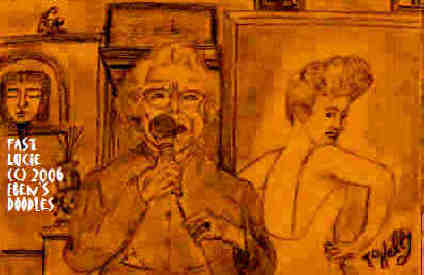
All this--the bass guitar, the organ, Fast Lucie and the bawling, toilet-mouthed man, was more than Ero could take.
Fortunately, a door had appeared where it had been before, and seeing it Ero escaped without a moment's hesitation. He burst out into the fresh air, and then fled back up the street, just to get as far away as he could. Nothing, he was determined, was going to trap him like that again. He headed straight for the ship, running as fast as he could.
The steep hills, however, soon slowed him down. He grew confused. The streets all looked the same to him. He was trying to find the Olympic-style stadium he had seen, but he must have passed it, he thought. He kept going, in the direction of the waterfront where the Argo V was tied up--at least he thought he was heading that direction. Coming down Carr Street, after what seemed like several miles, he saw the water ahead. But he was footsore, and stopped to rest. At that moment he saw a simple frame house with a high gable, a porch and a sign above it titled "Seamen's Rest." A motherly looking woman in a flowing, old-fashioned, black dress of a widow was standing on the porch, smiling and beckoning to him. A young blonde-braided girl, also dressed old-fashioned in a long dress and a dark, lace-fringed cap, stood by her as if they were awaiting him.
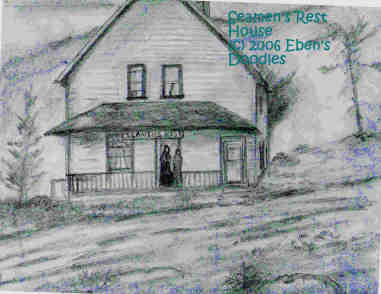
"You're a young man from the White Ship," the woman said with a singsong accent, "and I am Mrs. Funnemark, Christine's mother."
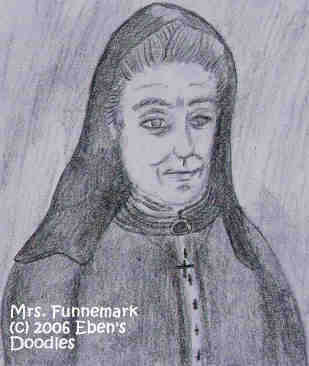
The young girl laughed and shook her braids.
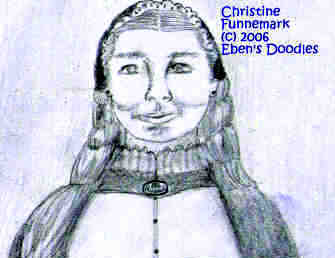
The former Olympic torch bearer of the secular 22nd Century Crystal Age did not know what a mission was, Christian or otherwise, and had no desire to find out. Besides, the house had the strange look of being way out of its time period, by at least a couple centuries. How could he put it politely, that he wasn't interested in their hospitality and "comfort"? Then he thought of something. "I am probably late to my ship. They might leave without me."
Both women laughed! "Oh," Mrs. Funnemark said, "I've met your good captain already, and he agreed to lay over another day if any of his hands are late in returning. So come right in and have some coffee and doughnuts. Christine here will sing you a nice song at the piano! She plays well for her age, I think you will agree."
Ero could not resist that--he felt he was starving for food, for the first time since he disembarked. Anything, even these offered "doughnuts" sounded good to him right then. He hurried after the women into the house, and found himself in a parlor with overstuffed furniture, a lot of newspapers and books, a piano, and a highly polished table with a bouquet of flowers set on it in a tall crystal vase.
Filled with embroidered pillows and lace doilies and needlework flags of Norway, it was a quaint though beautiful room, everything dusted and shining with polish and cleanliness.
He saw a staircase, too, leading to the second level, on which he heard slow, halting footsteps and a tapping with them. A mariner came down slowly and entered the parlor, greeted Mrs. Funnemark and Christine, who introduced him to Ero as Mr. Christolph, the sole survivor of the British clipper Atalanta that sank hard by Deception Pass, which was famed for its treacherous, fast currents. Mr. Christolph, unable to sail again from injuries in the Atalanta's sinking, using a cane, exchanged some books from the little library in the parlor, and taking a doughnut and some more coffee went even more slowly back up the stairs.
Mrs. Funnemark glanced at the old sailor as he went away. She smiled at Ero, observing, "Many sailors are like that, I find, toward the end of their seafaring. It is a dangerous, hard life they have. They start off so young, many of them mere boys who skip out of school if they can to run off to sea for the adventure of it. They are strong and courageous and good-hearted. That serves them for a time, but the hardships wear on them, and they turn old before their time. Without education, children in their minds, they fall prey to the temptations of the ports, many of them. All the money they earn is taken from them--so they never can save anything. When they finally are old, they suffer in their bodies, and need care. So when they come by here, we try to do whatever we can to ease them. They never remain here long, for their adventurous hearts always urge them to move on to some other place--always roaming, until they die in a lonely room somewhere. They like to be quiet here and remember their younger days, the good days, at sea, so we let them talk when they want to, or be silent if they wish! I am telling you all this, because you are just starting out, are you not?
Sitting down where the women showed him, Ero was handed a tray with a big pile of fresh doughnuts and a steaming cup of coffee. As he devoured the homemade but somewhat bland doughnuts (though he would have preferred roast goat with rice, some cheese and green olives, Turkish coffee and dessert of marzipan), he heard the girl begin singing at the piano, and her voice, though not remarkable, was sweet enough. He began to listen once his stomach pangs went away. Mrs. Funnemark refreshed his cup, and offered him cream and sugar.
The room was warm, and he felt so at ease there that his head fell back on the couch, and the next thing he knew someone had laid a blanket over him, and then gently guided his head to a pillow and his feet to the other end of the sofa, and he was oblivious to the world.
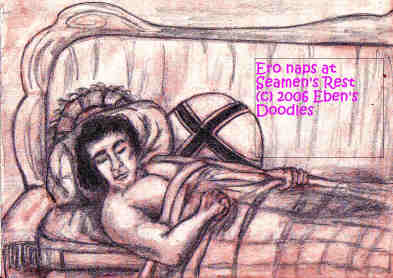
Her raised eyebrows and smile seemed to encourage him.
"What is this place"? he burst out. "Why are you doing this for me?"
Mrs. Funnemark glanced toward a gold-framed picture of a bearded sea captain over the fireplace mantel. "My husband and his ship and crew went down, all drowned--and so I felt called of the Lord to do something for seamen if I could. I sold our home in Norway, and here where we landed my daughter and I have tended seamen like you since then. We have never regretted it. So many sailors have come to our door--we have a guestbook you must sign before you leave and go back to your ship, young man."
Ero looked at the guestbook she had meanwhile picked up and was handing to him.
It fell open, and her eyes caught the names on the sheet. She started telling him about the entries, whom they represented.
After he listened to her tell something about each ship, he had to ask her something. "What is this city? I don't think I like being here. I want to leave. It is like no city I have ever known. Where are all the people?"
She smiled, but her eyes were not smiling. "It is called the City of Destiny, young man. It has three Gates, or three Doors--the Door of the World, the Door of Flesh, and this Door of Seamen's Rest Christine and I keep here for sailers like yourself--make of it what you will. You can leave this city now with your ship and good captain, but you must choose once you've come ashore. What door, what doors, did you choose, young man? For I know you have gone into the city, seeking your own destiny, before you came here."
"What do you mean by 'World," and what is 'Flesh'?" he asked, just like a Greek.
Mrs. Funnemark, gathering the plates and napkins, turned to Christine. "Dear, you tell him, while I go and wash up. If I need you to come and help tidy things a bit more, I'll call."
She went out to the kitchen, leaving Christine and Ero in the parlor--who could not have presented a more strange sight--a young lady properly dressed from her toes to her chin, and a Greek torch-bearer with just his running shorts.
Christine turned to Ero, who was embarassed to be left alone with her, though she was too old-fashioned to his eye to be attractive.
The sea captain's daughter eyed him keenly, as one who knew sailors top to bottom, fore and aft. And she knew exactly what all the rigging was for, and what to pull to haul up the main sail or trim the jib sail too.
She held out a small, glossy-black book. "Here, read this please. It isn't very long. It will tell you what the Door of Flesh is."
Ero took the book reluctantly, glancing at its title, "Diary."
Christine noticed his glance and explained. "It is one sailor's account of his time here. He came off the British clipper, Dashing Wave."
Ero opened it to the first entries, and it was in English, but that was one of the world's official languages, so he had no need for Christian to translate.
He began reading.
Oct. 29--"Was paid off this morning. Decided not to sign back on. Went to Seamen's Rest, but could not settle myself to read. Met a dandy bloke, from Captain Wolvewoeld's clipper, Sea Wolf, took him around town to show him the hot spots...we had quite a spree. Turned up at the Rest slightly excited, but cold not sit still for five minutes...had to run out for more beer at old Red Kelley's.
Oct. 30--"After dinner I went to the Rest, where I had a long talk with Miss Funnemark, being greatly touched by her wonderful faith in God. She gave me those Norwegian cookies too--with the funnny Norwegian names, but all tasted good.
Nov. 17--"Turned out 10:30 in a very uneasy state of mind, a sense of foreboding evil overpowers and smothers me like big black wings...met Miss Funnemark who told me I should not do anything crooked...am sure something is going to happen, tho' don't know what. At the Rest, heard of the loss of the Dashing Wave. She went down off Alsea Bay, 16 miles south of Yaquina Bay, taking all my chums. Would God do that if he were a good God as the Funnemarks tell me? I doubt it!
Nov. 18--"Captain Wolvewoeld returned to port, and is needing a few hands after some little mishap, bumping another vessel in a fog off the Columbia River. Should I sign on or not? Can't decide. You have to sign on pretty much for life, with this skipper. Not sure I want to spend my whole life on his one vessel. Heard he was looking for hands down by Yaquina Bay near where the Dashing Wave, bound for Britain via the Horn, went down--but no sign of anything but the wheat cargo floating everywhere and some salted pork barrels cast high and dry on the beaches.
Nov. 19--"Got on a horrible drunk with the jolly boys on shore leave from the Sea Wolf, then went to the Rest...Oh, how I felt when I came to myself and found out where I had been and where I was. When I undressed for bed, saw there was lipstick on places I would be ashamed to tell anybody. I never felt so dirty, drained, used up."
Ero flipped through the next pages, all blank, then turned to Christine. "Is that all?" he asked, surprised. "It is a very short account he wrote. Why isn't there more?"
Christine looked down. "But he chose and ended it exactly there. You see, he took his own life. He jumped from the roof of that unfinished train station hotel overlooking the Olympic stadium. Since the book was left here, we came into possession of it. He gave us no address when he signed our guestbook, so we can't sent it to his family or relatives. Now do you understand what Mama meant by "Flesh" and the fateful Door it represents?"
Ero thought for a moment, shifting uncomfortably on the sofa, which seemed to grow hot, then cold. He remembered Kelley's, and the sailor's account pictured what happened to anyone who could not escape from there. Maybe he thought he could escape his desires if he killed himself? Maybe he thought that was the only way out? Was it? Ero could not be sure. He too had desires--and he had never dreamed that he should resist their control over him--not until, that is, he read the sailor's account and heard from Christine how he ended up.
It made him think all the more. He could not resist asking something that had nagged him about Crazy Dan, and until now he had not been able to put it into words. This seemed to be his opportunity to get clear on the matter, before he shipped out with his captain.
He rose and moved toward the door. "I gotta go, but I do have another question. What is the Door of the World?"
"You can become a slave to the desires of the Flesh, which ultimately demand your soul in payment," she said. Ero, out of the porch, paused. It was quiet on the porch, then he was moved to aay, "I don't think I have a slave to my desires, though I now see where they can lead a man. But the World? What is that?"
She followed him down the steps. Her pale blue, almost gray eyes seemed to grip his. "The World? It is the lust of the eye and the pride of life that is in it. Men hunt the World's glittering gold, wealth and status, power and prestige--and they too will turn hunted and lose their souls when the World demands full payment, as it always does. Remember, what the World gives so sweetly and generously, it will someday take back, with razor-edged shark's teeth. That is why you should not seek its honors and rewards, or if you do seek them, then don't give your heart to them, or they will enslave and utterly ruin you. We can give you the names of so many who were ruined in this way--"
But Ero had heard enough and wasn't listening. Her words "they too will turn hunted..." and "it will someday take back, with shark's teeth" burning inside his heart, the former Olympic torch bearer walked quickly off.
"Good-bye!" she said. "You are always welcome at the Rest!"
Only when the high gable of the Funnemarks' home was out of sight did Ero realize he was carrying something. The diary! He took a few steps back toward the Rest, then stopped. He shook his head, then flung the suicide's last words into the bushes off to the side and continued on, hurrying to the White Ship, anxious as he was to get away from Kelly's, Crazy Dan, and now Seamen's Rest.
Ero swore, but the buzzing only got worse as he went further down the road. Going back, he read what it had to say.
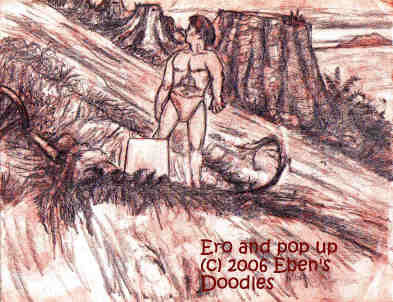
Ero knocked on the door, not finding Mrs. and Miss Funnemark standing on the porch to greet him. After four knocks still nobody answered, so he was about to turn away when he heard the tap-tap-tap of a cane approaching the door from within.
The shipwreck survivor opened the door and gaped at Ero as if he were a stranger.
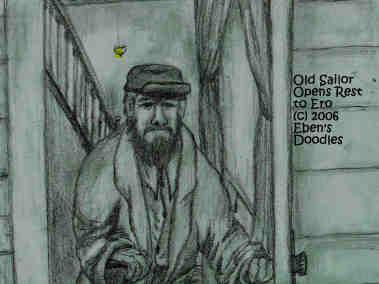
Before he could say any more, the old salt turned and tap-tapped away, leaving Ero standing there in the doorway like a fool.
Not knowing what to do, he took a step in, and then saw the big note pinned to a sofa cushion next to the newly set up Christmas tree, that shone top to bottom with lighted candles that dropped no wax or showed any sign of burning down.
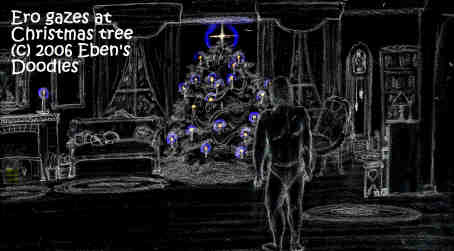
With the other change of clothes bundled into a roll that he stowed under his arm, he started off, his feet crunching in a foot or more of snow. He glanced back at the house, and it looked so cheerful, with a wisp of smoke from the chimney above the high gable, and a lantern lit in a second level window shining out on the drifted snow. It was beautiful.
But a thought suddenly intercepted him. "Why not go and enjoy a few draught beers at Kelley's to warm you for the long voyage ahead? You deserve it!"
That sounded like a very fine idea to him, and he changed direction and headed toward the downtown section of the City of Destiny. Strangely, the snowfall stopped right at the city limits and it grew warmer the closer he got to Kelley's. It was so hot he couldn't stand the shirt, and he stripped it off. Again, he was a little out of synchonization in the allotted time frame, and he dropped his kit on the ground, as he saw something ahead moving determinedly along the same route he was on.
A frog! It was hopping, making big hops, straight toward Kelley's Tavern.
Where was the high-pitched voice coming from? Not from a frog surely? He caught up to it, and got it in his hand.
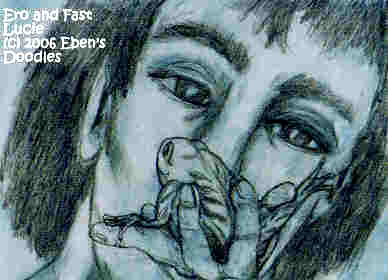
Ero, a look of horror coming over him, put the frog gently down on the sidewalk in front of Kelley's. He backed away, but not before he saw the frog vanish and Fast Lucie where the frog had been a moment before. Still singing, she went in the door.
Kelley came out almost immediately, his big apron floury with the makings of pizza, beckoning to him with his arm. "You're just in time! Cmon in! You don't wanna miss the good times, Happy Hour, and Fast Lucie here doing the entertaining! You even get one free pull tab on the house after the first two beers--after that it's one freebie every four drinks. You can win yourself a bundle. We're all winners here--you'll see! It's just a matter of time!"
Ero backed away even further, then turned and ran. He heard Kelley yelling, and Fast Lucie too, but he soon put them out of sight and hearing as he raced back straight to the waterfront of old Ruston and the White Ship.
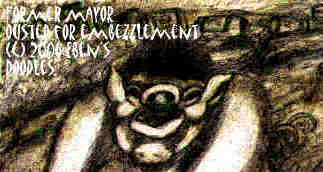
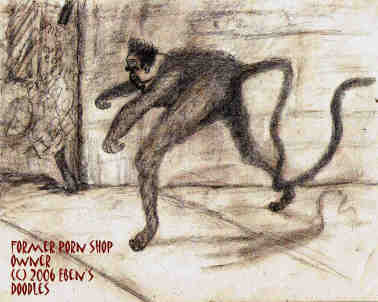
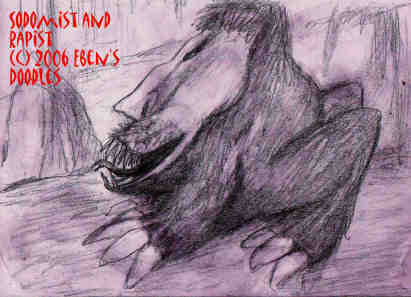

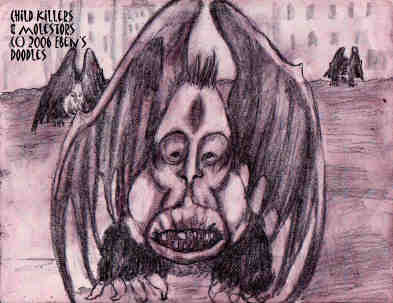
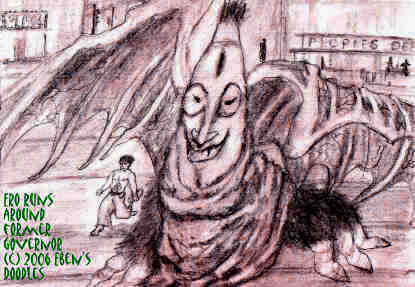
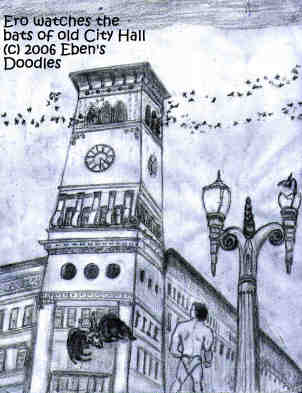
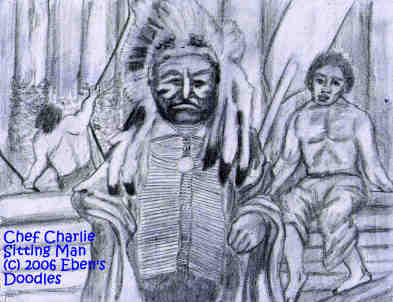
Ero was astounded. The chief was an absolute stranger, but he realized he had clean forgot, in running all over the area, half of his reason for being given shore leave--the other half being whatever provisions he could rustle up.
Between gasps, he tried to describe what he had been through, but the captain waved his excuses aside.
"We'll wait! Just go with him now, and return by the same route, without any detours this time, okay?"
The chief had come outfitted with his own canoe (thanks to Wally's foresight), and within minutes Ero was paddling the chief (for he was old now and not much good at canoeing) toward the river that would lead them eastward (as he would soon discover) up from the bay to the "Tipi of the Harps."
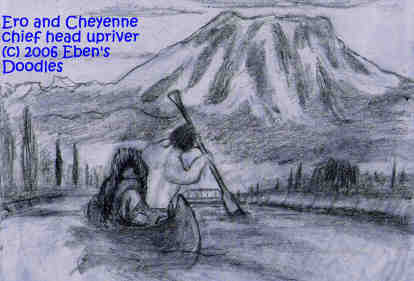
Evenso, his hands and shoulders were aching when they finally arrived at a point where the chief grunted, pointing to the bank. It turned out to be a watercress-filled creek, broad and slow moving. They moved through low-lying pasture land. It took them into the middle part of the sandy, hotcake-flat valley, where the creek narrowed so much they had to get out and start walking. They had walked about a mile when they passed down streets and avenues of houses and businesses--all empty of people. Where had they all gone? There was no one to ask. To Ero it seemed to take forever, for the old chief moved slowly, as if he did not care anything about Ero's ship needing to set sail. They passed a large, fenced Fairgrounds with an antique, 1900s-era roller coaster set on high, white-painted wooden supports. Finally, they came to a small park with the bronze statue of a pioneer farmer and founder of the town--a small but mighty man who had made a fortune in hops and put the town on the map and had even been invited with his wife to the court of Queen Victoria of England.
"He was friend of Indian people," briefly commented the old chief. "He gave his town the name of tribe here, the Generous People. But Chiefs of tribe here no good!"
The chief pointed at the statue.
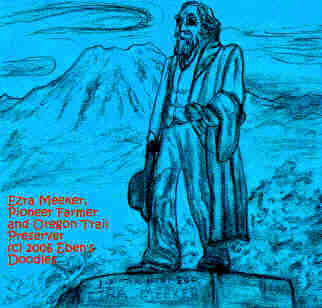
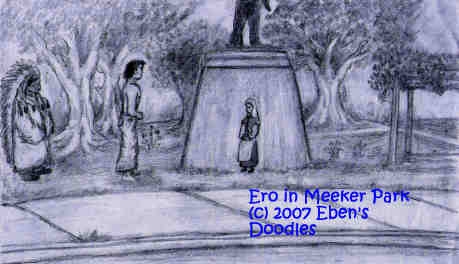
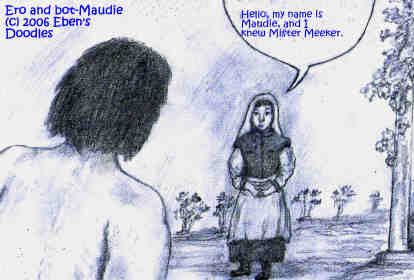
Ezra Meeker (for their dad and the wagon master had met sometime before) greeted their father as "Doc," and the girls got a good, close look.
Snow white hair cascaded to his shoulders, eyebrows like bushes, piercing, bright eyes, whiskers, sideburns, and no hat. He looked like Daniel Boone in his buckskins, only much older!
After greeting the girls too, he led the way to his sick oxen, Queenie and Buck, who lay bloated and gasping for breath. The men, including the town watchmen, lay wet gunny sacks on the hot, sweating oxen, and forced some water down their throats. This seemed to help, and then everyone went aboard Mr. Meeker's homey house-wagon.
The girls knew what to do. The men brought firewood, got the potbellied stove hot, and Maudie and her sister made johnnie cake while Mr. Meeker rustled up some hot coffee, boiling it in an old blue pot. The aromas were delicious. The men made short work of the huge stack of johnnie cakes covered with molasses and bacon drippings.
Mr. Meeker rose from the table and got a harmonica, and he played "Rock of Ages" and "Jesus, Lover of My Soul." He let Maudie try out the accordian, waiting for her to play each note at a time with one finger.
Then the men went out to check on the animals, while the girls looked at Mr. Meeker's many pictures of far-away places.
Presently, they could hear the sound of shovels and dogs whining. Mr. Meeker came back to the wagon, asking how the girls were, then they heard him, his head laid against the wagon, weeping. Their own papa put his arm around Mr. Meeker's shoulders.
Months later, Mr. Meeker returned to their village of Carlton, with a new pair of oxen (he had two pairs to pull the big wagon-house, plus a horse, and a cow, which made a small caravan for traveling the Oregon Trail as he loved to do to keep its memory alive).
The whole village got out to welcome him, and they were singing, and carrying on in anticipation when the a cheer went up and Mr. Meeker's wagon appeared and stopped in the middle of the street by the pump.
Everyone was singing and celebrating the big event of Mr. Meeker's return, when the mayor raised his hand to stop. What was wrong? Mr. Meeker was very ill, and had to be taken at once to a hospital in Hebron. The crowd fell silent, for sympathy, but the girls ran to Mr. Meeker. Maudie thought to show Mr. Meeker her new red shoes, but he wanted to know something. "The flowers out there on the graves--did you put them there?" Yes, they said. "Bless you, little nurses, bless you," he said. The caravan carried Mr. Meeker away in the back of his wagon, and the girls continued to put violets on the graves, and added oyster shells they picked up from the tracks, which they used to spell out the names of Queenie and Buck.
Maudie, after telling him this long story, looked pleased with herself, and bright red shoes and all faded away back where she came from.
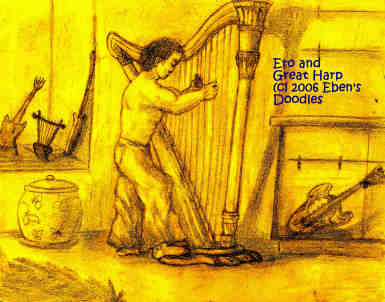
"Not like some tribes. Take nothing that's not ours. No good now for me--I have no Cheyenne in this land here!
To help protect it from getting wet, Ero wrapped the Autoharp he had selected in a newspaper, the Herald, he found in a big pile of local papers left unlighted on the floor by some distracted arsonist, and the chief had already moved toward the door. Realizing he had no time to waste, Ero gave the shop not even a backward glance--though its valuable harps, not to mention the huge, gold-plated one, were gathering dust and slowly turning useless.
The chief, not as mindful of the time, took a different route as if he wanted to do a little more looking around.
The valley and its steep slopes used to be heavily wooded. Great trees grew in an inpenetrable jungle that only the saws of the loggers and the sawmills could conquer, tree by tree. Finally, one great tree remained, and the chief led Ero to it. At that moment it was being cut down (for Wally had tweaked the time coordinates a bit, temporarily turning the clock back to the 1920s). Ero could not believe at first the girth and the height of the tree--for Greece had nothing to compare with it, being virtually treeless since the original forests had been cut down to make ships and build houses and even city walls.
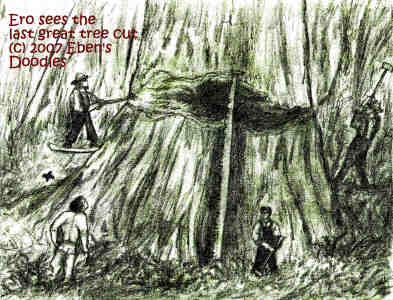
Down the street was a second bridge across the river, and walking just beyond it they came to a tree house built by a pioneer family.

Ero, sharing the food with the chief, told her where the ship was waiting for them. She brightened up when she spoke again, after a brief comment with her sister.
Ero looked at the road, which was empty of traffic, and wondered how she did not notice. Was she remembering how it had been before--? An image formed immdiately in his mind, of a mountainous wave of mud, rocks, and trees moving down the valley from a huge gap in the side of the mountain towering over the head of the valley where the ice and rock had fallen suddenly away on the mountainside. It was but a momentary image, but he knew there could be no such valley as he was seeing if such a thing ever happened. It was a chilling thought, but soon over. He handed the empty basket back to the sisters, and thanked them.
"I can teach them to you, if you can like. You could even sing along, if I give you the words. One is called 'Beautiful Savior,' and the other is 'Blessed Assurance,' and the third is 'Amazing Grace,'--all my favorites, because I can't just choose among them."
Ero looked off toward the port, then back to the sisters. "Thank you, but we have to go now to catch the ship--or we will be too late."
Ero could not see it from there, of course, but Captain Pikkard had already run up the Blue Peter calling the crew back.
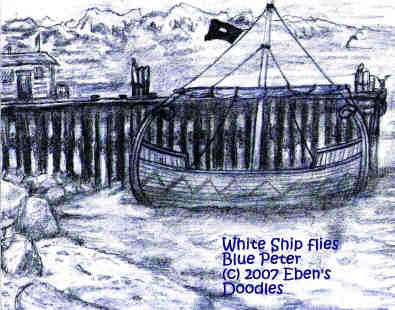
Ero and Charlie Sitting Man left the town by the same route, found the canoe, and in a short time they were down the creek and back in the river, letting Ero rest his arm and paddle as the strong current of the muddy river carried them swiftly toward the bay and the waiting White Ship.
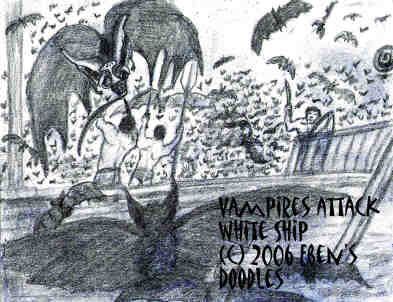
Ero soon finds himself fighting for his life with a "brame"--a particularly aggressive kind of vampire. He brains the Brame with an oar and rids the world of Kastorr of one less horror.
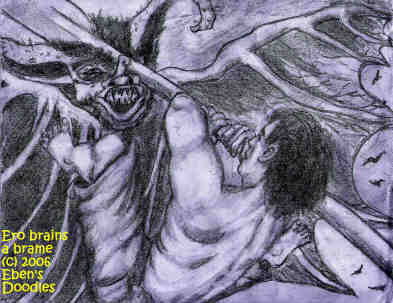
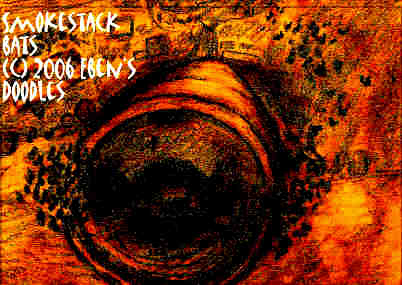
On a popup screen, a map appears, and the captain makes a quick but already considered decision, choosing one of three options.




